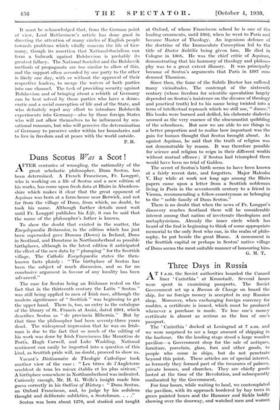Duns Scotus Was a Scot !
AFTER centuries of wrangling, the nationality of the -ES- great scholastic philosopher, Duns Scotus, has been determined. A French Franciscan, Fr. Longpre, who is working on a life of Scotus and a new edition of his works, has come upon fresh data at Blairs in Aberdeen- shire which makes it clear that the great opponent of Aquinas was born at a farm-house near Berwick, and not far from the village of Duns, from which, no doubt, he took his name. Although further details must wait until Fr. Longpre publishes his Life, it can be said that the name of the philosopher's father is known.
To show the doubt that existed in the matter, the Encyclopaedia Britannica, in the edition which has just been superseded gave Dunurn (Down) in Ireland, Duns in Scotland, and Dunstane in Northumberland as possible birthplaces, although in the latest edition it anticipated the effect of the new data by" plumping " for the Scottish village. The Catholic Encyclopaedia states the then- known facts plainly : "The birthplace of Scotus has been the subject of much discussion, and so far no conclusive argument in favour of any locality has been advanced."
The case for Scotus being an Irishman rested on the fact that in the thirteenth century the Latin " Scotus" was still being applied to men of Irish race, although the modern significance of " Scottish " was beginning to get the upper hand. There is, too, an entry in the catalogue of the library of St. Francis at Assisi, dated 1381, which describes Scotus as "do provincia Hibernia." But by that time the philosopher had been seventy-three years dead. The widespread impression that he was an Irish- man is due to the fact that so much of the editing of his work was done by Irish Franciscans like Mauritius de Portir, Hugh Carwell, and Luke Wadding. National sentiment can easily be imported into a question of this kind, as Scottish pride will, no doubt, proceed to show us.
Vacant's Dictionnaire de Theologie Catholique took another view of the case : "Les titres de l'Angleterre semblent de tous lea mieux etablis et lea plus serieux." A birthplace somewhere in Northumberland was indicated. Curiously enough, Mr. H. G. Wells's insight made him guess correctly in his Outline of History : "Duos Scotus, an Oxford Franciscan, and, to judge by his sedulous thought and deliberate subtleties, a Scotelunan. . . ."
Scotus was born about 1270, and studied and taught at Oxford, of whose Franciscan school he is one of the leading ornaments, until 1302, when he went to Paris and became Master of Theology. An ingenious defence of the doctrine of the Immaculate Conception led to the title of Doctor Subtilis being given him. He died in Cologne in 1308. He was the chief critic of Aquinas, demonstrating that his harmony of theology and philoso- phy was to a great extent illusory. It was principally because of Scotus's arguments that Paris in 1887 cons demned Thomism.
Since then, the fame of the Subtle Doctor has suffered many vicissitudes. The contempt of the sixteenth century (whose freedom for scientific speculation largely depended on Scotus's insistence on the divorce of theology and practical truth) led to his name being twisted into a term of intellectual reproach which we still use, "dunce.' His books were burned and defiled, his elaborate dialectic scorned as the very essence of the obscurantist quibbling of the schoolmen. But now we are able to see things in a better proportion and to realize how important was the gain for human thought that Scotus brought about. As against Aquinas, he said that the truth of religion was not demonstrable by reason. It was therefore possible for science and religion to reign in their different worlds without mutual offence ; if Scotus had triumphed there would have been no trial of Galileo.
The secret of Scotus's birth seems to have been known at a fairly recent date, and forgotten. Major Malcolm V. Hay while at work not long ago among the Blairs papers came upon a letter from a Scottish nobleman living in Paris in the seventeenth century to a friend in Vienna, recommending a fellow-countryman as belonging to the "noble family of Duns Scotus."
There is no doubt that when the news of Fr. Longpre's discovery reaches Scotland there will be considerable interest among that nation of inveterate theologians and metaphysicians. Already the inner circle which has heard of the find is beginning to think of some appropriate memorial to the only Scot who can, in the realm of philo- sophy, be put beside the great Hume. A monument in the Scottish capital or perhaps in Scotus' native village of Duns seems the most suitable manner of honouring him.
G. M. T.




















































 Previous page
Previous page